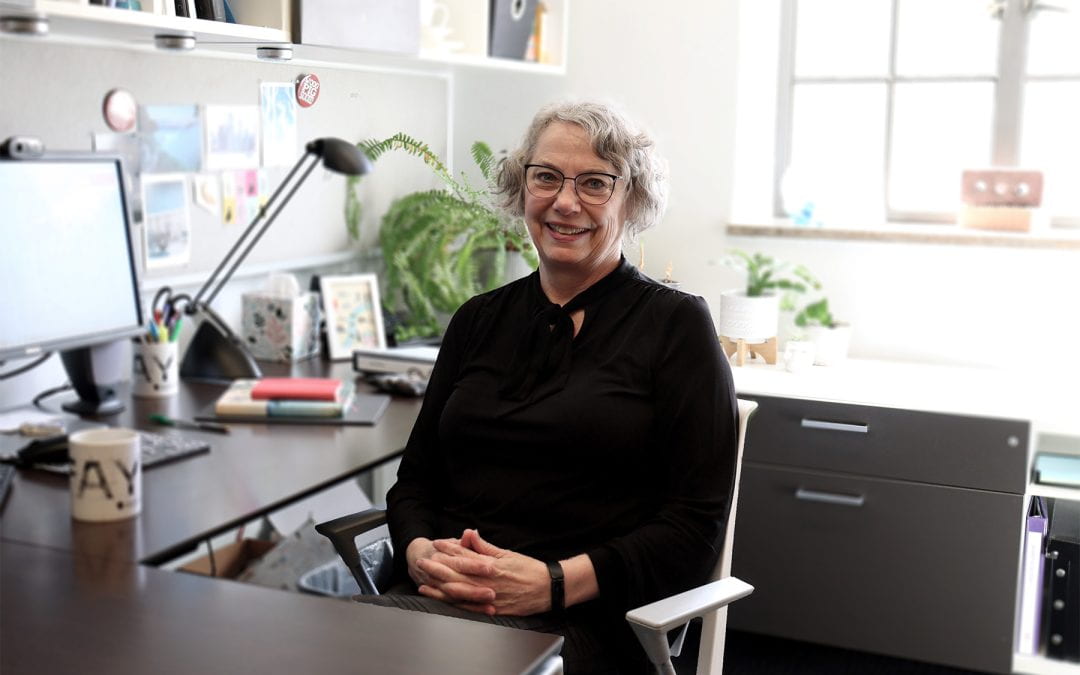Theresa Parrish joined the Fay Jones School in 2014 as an administrative assistant. In 2019, she transitioned to the academic counselor for first-year students. In 2020, she also started co-teaching the school’s first-year experience class, University Perspectives.
What brought you to the Fay Jones School?
My husband and I moved here in 2014 from Chicago. I had just finished seven years as a bereavement coordinator at a hospice, and I was extremely burnt out. When I started looking for a job, my goal was just to have a job that would help with the insurance. I was hired as an administrative assistant by the Department of Landscape Architecture. Pretty soon, I was the administrative support supervisor. I loved that job — working with the department heads and the faculty. I loved it. When they added this position for first year academic counselor, I felt like it was a better fit for me. I wanted to deal more with students and help them succeed.
From bereavement counseling to student counseling — what are the similarities?
You learn in counseling school about unconditional positive regard for the person walking in the room. You see a person, and you expect the best out of them. You expect good from them, and so that transfers over. Also, just being able to listen well, maybe read between the lines sometimes. I don’t attempt to do therapy and counseling, but just recognize the signs and general demeanor.
What is the most difficult part of your job?
The numbers. Over the past two years, our numbers have increased dramatically. When I started this fall 2022 semester, I had 300 students. It is more difficult to provide individual help, to keep up with the students who are at risk. It is also just physically and mentally exhausting during advising season. I’m not really a person who likes to sit, so it’s exhausting.
We also see more and more parents helicoptering. It really is not in the best interest of the students because they get here and they’re helpless. I tell students in the University Perspectives class that I will not talk to your parents unless you physically cannot talk to me or write an e-mail.
What is your favorite place on campus?
My favorite place is really my office. I just like how the light comes in, and I love my plants. It’s very safe and cozy. If I had to say another place that would be the secret garden by the Horticulture building; you can sit on the benches and then there are gardens you can walk through.
What skills or hobbies are you trying to master?
Right now, I’m working on my Spanish. I’m retiring in May, and I plan to help a friend who started her own nonprofit advocating for poultry workers in Northwest Arkansas. Those poultry workers are mostly Spanish speaking, and so to better help to her, I’m brushing up. I’m not sure how I’ll help her; I’m just getting ready.
What accomplishments are you proud of?
When we moved to Chicago, I joined a group who swim in Lake Michigan every morning. We would normally swim half a mile out to a pier and then go back. One of the members decided he wanted to do the Big Shoulders Open Water Swim Classic race and asked me to do it with him. It’s an open water race, an international master’s event. There are people who come from all over the world. My goal was just to finish it, not to win anything but just to do it. It’s a mile and a half in Lake Michigan in September, so the water is very chilly. I swam it three times. The last time I did it, it was very choppy. Most people who do that come from a background of competitive swimming, but I did it just as a hobby.
If you could do anything, what would you do?
As I grew older, I discovered that I really love nature and the outdoors, probably more than I love people. I think being a field biologist or something like that would be the perfect place for me, something where I’m outdoors and have a more active lifestyle.
What is something that you wish students knew about you?
I wish my students would know that there is nothing they could tell me that would surprise me or cause me to think badly of them. The assumption is always when you’re young that older people don’t understand, and you can’t be vulnerable in front of them. But you really can tell me anything. I’ve heard it all — and probably some things that would curl your hair. The more honest a student is when we meet, the better I can help them.
